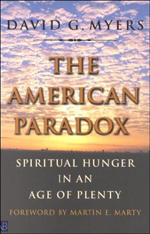
In the early 1960s, the Beatles bemoaned the fact that “money can’t buy me love.” Some forty years later, author and social psychologist David Myers reports in The American Paradox: Spiritual Hunger in an Age of Plenty that money hasn’t bought us happiness or spiritual well-being either. Myers, a faculty member at Hope College (Michigan), has devoted many years to exploring the dual questions of who’s happy and why. In the process he’s discovered that, for most Americans, personal well-being and contentment are an elusive dream. By every global measurement, contemporary or historical, North Americans are among the richest people who have ever lived. Yet, in Myers’s words, “Never has a culture experienced such physical comfort combined with such psychological misery.”
Therein lies the quandary at the heart of his latest book. How can it be, Myers asks, that Americans “have been soaring materially and, until recently, sinking socially?” He pursues this question across four decades and through mounds of media sources and national polls. The range of quotes, newspaper clips, and academic studies referenced in the book, along with a lengthy “Notes” section, suggests the author has left no cultural trend unexplored. Through a happy wedding of scholarship with journalism, Myers has produced an informative and easy-to-read guidebook for cultural explorers.
The time frame of the book is 1960 until the early 1990s—a period during which, according to Myers, “America slid into a deepening social recession that dwarfed the comparatively milder and briefer economic recession that often dominated our news and politics.” He develops a lengthy list of societal woes—including doubling of the divorce rate, tripling of the teen suicide rate, quadrupling of the violent crime rate, quintupling of the incarceration rate, and numerous other negative trends—as evidence of a troubling cultural shift. On the whole, the picture of our national psyche that emerges from Myers’s efforts is anything but pretty.
That said, however, his work is not without hope. “After dealing with the paradoxes in his finely nuanced way,” Martin Marty writes in his forward to the book, “[Myers] does tilt his hand a bit, and we get some glimpses of what he thinks are elements of a better society, and glances at some means he sees of producing them.” Myers speaks of “a faith-based optimism” that enabled him to identify “harbingers of social renewal that are emerging like crocuses blooming at winter’s end.” Out of his own optimism, he urges readers toward “the less traveled road” that leads to “increasing concern for personal relationships, the integrity of nature, and the meaning of life.”
As an antidote to the poisoning influences of rampant materialism and individualism, Myers points to “a new American dream—one that renews our social ecology with values and policies that balance ‘me thinking’ with ‘we thinking.’” And while Myers doesn’t have much to say about the role of organized religion in establishing this much-needed balance, he identifies the church as key to addressing the “spiritual starvation” of our day. “The church’s first concern is not social work, but developing spiritual roots for its followers,” he writes.
The American Paradox is a useful reminder for seminary heads and trustees of the current state of the society in which our schools operate. The book also helps explain the assumptions and aspirations students bring with them to their studies, and it describes the context of the church into which we send our graduates. As Myers tells us, leaders must prepare themselves to “understand the present and envision the future.” This is what The American Paradox is about.
Appetizer
One of social psychology’s premier lessons is that we are as likely to act ourselves into a way of thinking as to think ourselves into action. Not only do we often stand up for what we believe, we also come to believe more strongly in what we have stood up for. Saying becomes believing.
—The American Paradox